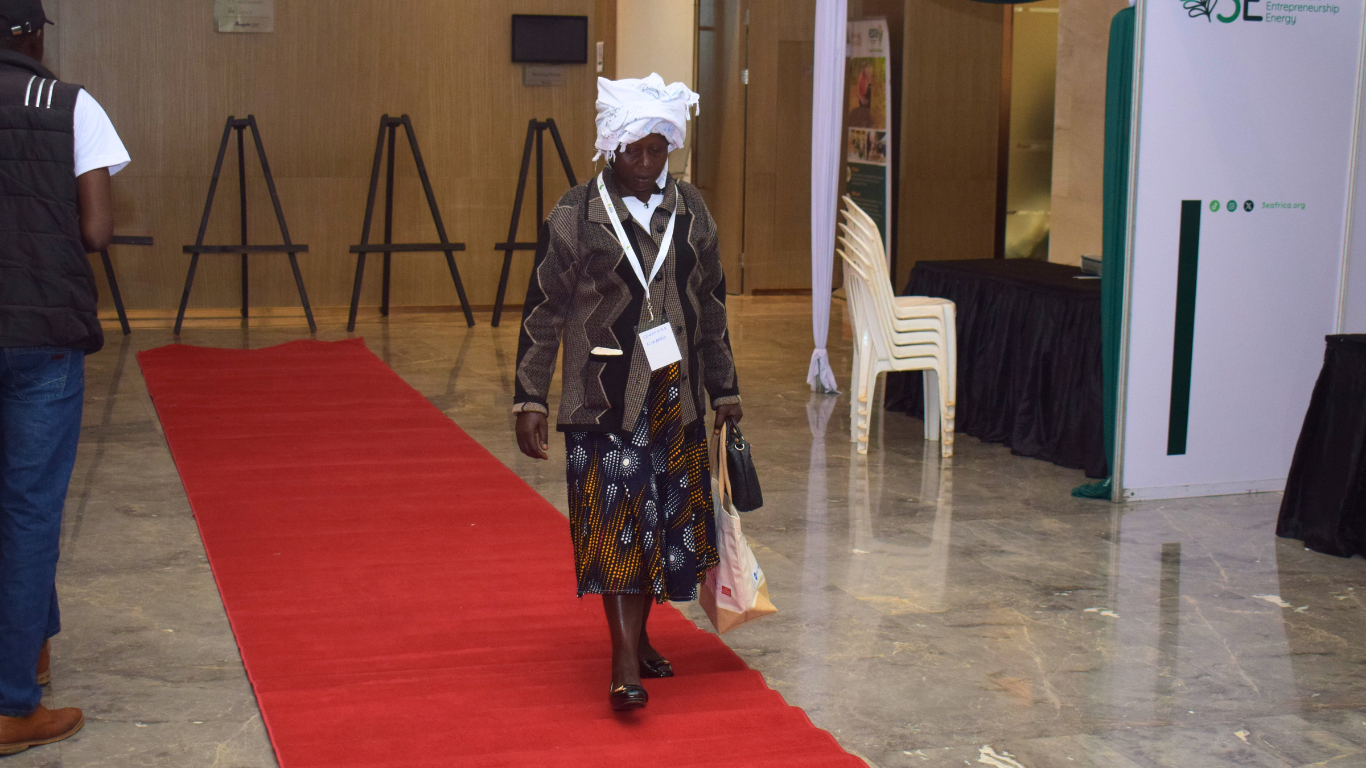Agroecology Talks Open with Calls for Farmer Recognition, Enterprise Growth, and Policy Reform

Delegates seated at Victoria Hall in Argyle Grand Hotel during the keynote session of the 2nd Eastern Africa Agroecology Conference in Nairobi, Kenya. March 25, 2025. KASS MEDIA/Chemtai Kirui
The 2nd Eastern Africa Agroecology Conference kicked off Tuesday, bringing together policymakers, researchers, and farmers for high-level discussions on agroecological farming system.
The four-day event, held at Nairobi’s Argyle Grand Hotel, has drawn about 700 delegates from nearly 30 countries, representing over half of Eastern Africa.
Participants are engaging in conversations about policies and innovations under the theme: ‘Strengthening Agri-Food System Transformation for Resilience, Sustainability and Socioeconomic Development.’
These talks come at a crucial time when Sub Saharan Africa is grappling with severe food insecurity.
The region remains far off track in meeting United Nations Sustainable Development Goal 2 (SDG 2), which aims to end hunger and promote sustainable agriculture by 2030.
In East Africa, countries like Somalia are struggling with food crises exacerbated by reduced aid, prolonged drought, inflation, and conflict.
A major focus of this year’s conference is the need to move beyond policy discussions toward actionable steps that better support smallholder farmers, reform restrictive seed laws, and establish clear funding mechanisms for agroecological practices.

“Can agroecology feed our nations? Indeed, we are saying it can,” said Dr. David Amudavi, Chair of the Conference Organizing Committee and Executive Director of Biovision Africa Trust, in his opening remarks.
Dr. Amudavi’s statement set the tone for a conference hall steadily filling with delegates eager to discuss solutions for scaling agroecology across the region.
He said that the forum serves as a platform to showcase agroecology as “a driver of resilient and sustainable agri-food systems.”

“We better understand agroecology through the examples we promote—organic, regenerative, and agroforestry systems that are already transforming lives,” he added.
Echoing these sentiments, Sir Sunday Bob George, Senior Agricultural Officer and Agroecology Focal Point at Uganda’s Ministry of Agriculture, Animal Industries, and Fisheries (MAAIF), stressed the importance of responsible land use.
“Land is a limited resource and must be utilized wisely to ensure food security,” he said.
Sunday, who was speaking at the 2nd Agroecology Talks side event, organized by the Alliance for Food Sovereignty in Africa (AFSA) — said that Agroecology provides solutions for proper land management, natural resource conservation, and biodiversity protection.

The AFSA-organized side event brought together farmers, entrepreneurs, and officials from Kenya, Zimbabwe, Uganda, and beyond to discuss scaling agroecological enterprises in Eastern Africa.
They shared experiences, commitments, and challenges, stating that ‘For agroecology to thrive, it must be economically viable.’
Discussions on the session, indicated the urgency of scaling up agroecology to improve nutrition and health, soil —and strengthen market linkages for profitability.
Speaking about the Advancing African Agroecological Entrepreneurship and Territorial Markets project, Andrew Adem, Food Systems Coordinator at AFSA, said: “This conversation is about showcasing real examples of agroecological entrepreneurship—how businesses are not just surviving but thriving within the agroecology model.”

“We are making a case that agricultural enterprises can lead in the transition to agroecology on this continent,” said Adem, adding that while agroecology is gaining recognition, there is still a need to showcase the role of enterprises in making it a practical and sustainable option for farmers and food producers.
Adem was officiating a panel featuring women agroecological entrepreneurs, showcasing success stories of small-scale businesses that have embraced innovation to thrive in the sector.

For farmers like Kanyesigye Juliet, founder of Kanyes Dairy Farm in Uganda, agroecology has been a giant-leap, allowing her to maximize limited land for greater productivity.
“Since adopting agroecology, visitors are amazed that we rear over 80 goats in a small space,” she said.
Juliet has expanded her enterprise by diversifying into value-added products, including goat milk-based soap and body lotion.

She is also researching the development of an organic liquid fertilizer made from goat urine, to further improve her farm’s sustainability.
“We make the most of small spaces—not just for farming, but for income generation, employment, and land efficiency,” she added.
Similarly, Zororo Taruvinga, a Zimbabwean chef, food entrepreneur and managing director of Zoro Nemugoti , championed indigenous food preservation as a key pillar in strengthening agroecological markets.
“What I make evokes emotion. Whether it’s tamarind, wild berries, or yams, these foods connect people to their roots,” she said.

Taruvinga said agroecological practices have enabled year-round access to crops like yams, allowing her to serve her market consistently while preserving Africa’s culinary heritage.
“Having yams throughout the year brings me back to how I grew up. It’s more than just food; it’s a cultural connection,” she added.
While farmers are seeing success with agroecology, systemic barriers—such as limited financial support and unstable markets—continue to pose challenges, with entrepreneurs struggling to access affordable inputs, fair pricing, and reliable distribution networks.
Alongside investment and policy support, AFSA also focuses attention on the need for clear funding mechanisms to support smallholder farmers, stronger regional collaboration to expand agroecological initiatives, and accountability in turning commitments into action.
This marks the 2nd Eastern Africa Agroecology Conference hosted in Kenya, following the inaugural event in March 2023. Its return signals growing regional recognition of agroecology as a solution for climate resilience and food security, amid increasing concerns over land degradation and the impacts of industrial farming.
As discussions unfolded on Tuesday, Dr. Ronnie Brathwaite, Senior Agriculture Officer at the Food and Agriculture Organization of the United Nations (FAO), said that “Agriculture is more than food production—it’s an integrated system that improves soil fertility, conserves resources, and supports economic stability.”
He warned that over-reliance on imported food exposes nations to risks.
“Many countries, particularly those dependent on imported food, are recognizing the risks associated with global supply chains. Agroecology offers a compelling solution, allowing nations to strengthen local food production and build resilience against external shocks.” Brathwaite said.

Host Kenya has identified agroecology as a key component of its agricultural policy, aligning it with national goals such as Vision 2030 and the Bottom-Up Economic Transformation Agenda (BETA).
The National Agroecology Strategy for Food System Transformation (2024-2033) recognizes agroecology’s role in strengthening food security and sustainable agriculture, while the Fourth Medium Term Plan (2023-2027) prioritizes agricultural transformation, signaling the country’s intent to integrate agroecological practices into its broader economic and development strategies.
However, implementation remains a challenge.
“One of our key expectations in this conference is to see real commitments toward implementing these agroecology-friendly policies,” said Benedetta Kyengo, founder of Feedback to the Future.
“We also need reforms to punitive seed laws and better government support for small-scale farmers to access markets beyond elite consumers.” She said.

Kyengo hopes this 2nd Agroecology Conference will move beyond discussions and see real commitments toward implementation.
“To truly transform food systems, we need bold policies that prioritize agroecology, ensuring farmers have the resources and support to transition sustainably,” she said.
Experts at the conference reinforced the urgency of action, pointing to scientific evidence that agroecological farming not only strengthens food security but also builds resilience to climate shocks. However, they cautioned that without targeted policies integrating agroecology into national agricultural strategies, countries risk missing a critical opportunity to create sustainable food systems.
With discussions set to continue until March 28, stakeholders remain hopeful that this forum will drive stronger commitments from governments and donors to support smallholder farmers and agroecological entrepreneurs across the region.



